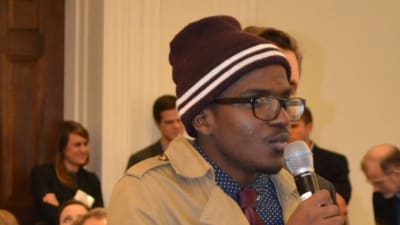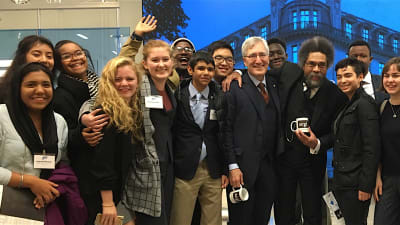Cornel West, Robert George, and the purpose of education
What is the purpose of education? That was the question legendary Princeton professors Cornel West and Robert George addressed at the American Enterprise Institute yesterday, with SEGL students and faculty in the front rows.
West and George have dramatically different views on many issues, but they often teach together. As AEI’s event description said, “Through their courses and their friendship, they have served as examples of how, when two knowledgeable and principled individuals come together in an honest and nonadversarial pursuit of truth, the competition of ideas deepens their own understanding of that truth.”
“[K]nowledgeable and principled individuals” who “come together in an honest and nonadversarial pursuit of truth” is what we strive for at SEGL, and watching the two men in action provided our students and teachers with much food for thought. At the center of the discussion was the Socratic phrase “the examined life.” What does it mean to live an “examined life,” and how can educators promote it? How does an examined life create benefits for society? How can we seek examined lives together despite our differences?
True to form, two of the four questions at the end of the session came from SEGL students. The first was directly related to a foundational SEGL teaching principle: “Do you think that an ideal liberal arts education is nonpartisan, [or] very partisan…?” “A liberal arts education interrogates all ideologies,” said George. In the ideal classroom, “any political, moral, religious view is on the table for critical examination. That doesn’t mean hostility; it means accountability. In that way, it is necessarily nonpartisan.” Later, he added, “any teacher who sees a student falling into intellectual conformism, into dogma…regardless of whether he happens to agree with the [view] or not, is going to want to make that student think, and try to break [the student] out of that.”
After the event, the two professors made time for our students, who asked individual follow-up questions and gave the speakers SEGL mugs as gratitude for the shared experience. Later, our faculty spent an hour discussing the implications the discussion had for our teaching: what was best about their pedagogical thesis, and what was best discarded? How ought we to sharpen our teaching as a result?
To view a video recording of the entire event, click below. (SEGL students ask questions at at 1:30:30 and 1:54:00.)

















